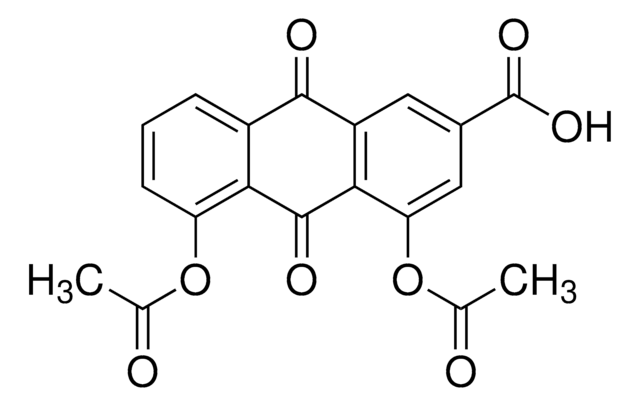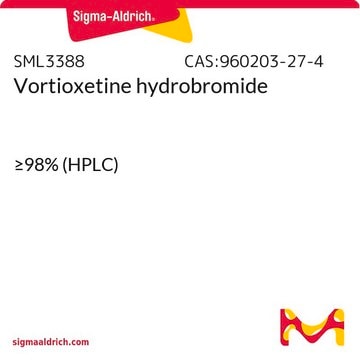SML2497
BIO 1211 trifluoroacetate salt
≥97% (HPLC)
Synonym(s):
2-MPUPA-LDVP trifluoroacetate, 4-(N′-(2-Methylphenyl)urea)-phenylacetyl-LDVP trifluoroacetate, BIO-1211 trifluoroacetate, BIO1211 trifluoroacetate, N-[2-[4-[[[(2-Methylphenyl)amino]carbonyl]amino]phenyl]acetyl]-L-leucyl-L-α-aspartyl-L-valyl-L-proline trifluoroacetate, N-[[4-[[[(2-Methylphenyl)amino]carbonyl]amino]-phenyl]acetyl]-LDVP trifluoroacetate, N-[[4-[[[(2-Methylphenyl)amino]carbonyl]amino]-phenyl]acetyl]-Leu-Asp-Val-Pro trifluoroacetate, N-[[4-[[[(2-Methylphenyl)amino]carbonyl]amino]-phenyl]acetyl]-fibronectin CS-1 fragment (1980-1983) trifluoroacetate
About This Item
Recommended Products
Assay
≥97% (HPLC)
form
film
lyophilized powder
storage condition
desiccated
color
white to beige
shipped in
wet ice
storage temp.
−20°C
InChI
1S/C36H48N6O9/c1-20(2)17-26(38-29(43)18-23-12-14-24(15-13-23)37-36(51)40-25-10-7-6-9-22(25)5)32(46)39-27(19-30(44)45)33(47)41-31(21(3)4)34(48)42-16-8-11-28(42)35(49)50/h6-7,9-10,12-15,20-21,26-28,31H,8,11,16-19H2,1-5H3,(H,38,43)(H,39,46)(H,41,47)(H,44,45)(H,49,50)(H2,37,40,51)/t26-,27-,28-,31-/m0/s1
InChI key
NVVGCQABIHSJSQ-KFZSMJGVSA-N
Biochem/physiol Actions
Storage Class Code
11 - Combustible Solids
WGK
WGK 3
Flash Point(F)
Not applicable
Flash Point(C)
Not applicable
Certificates of Analysis (COA)
Search for Certificates of Analysis (COA) by entering the products Lot/Batch Number. Lot and Batch Numbers can be found on a product’s label following the words ‘Lot’ or ‘Batch’.
Already Own This Product?
Find documentation for the products that you have recently purchased in the Document Library.
Our team of scientists has experience in all areas of research including Life Science, Material Science, Chemical Synthesis, Chromatography, Analytical and many others.
Contact Technical Service








